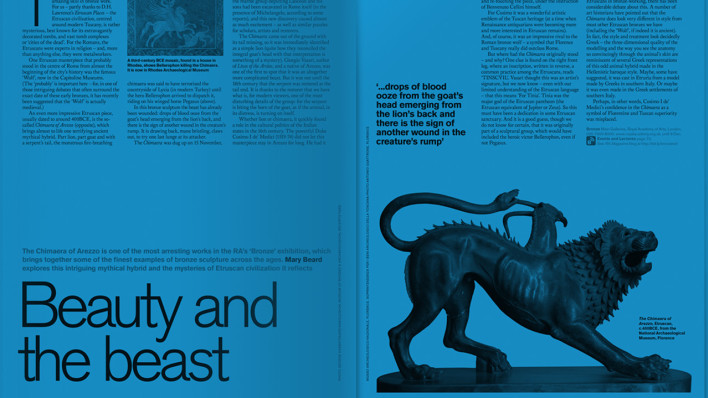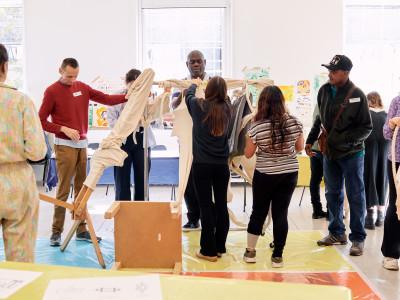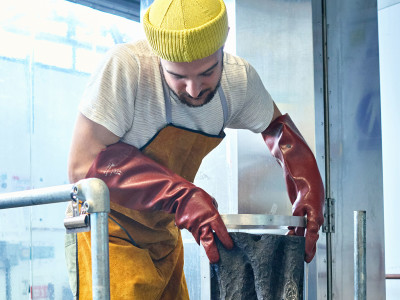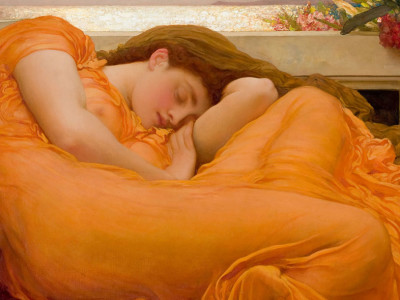
Author Ma Jian on Ai Weiwei and freedom of expression in China
By Ma Jian
Published on 29 September 2015
Ma Jian is renowned for his novels exploring subjects censored in China, where his books are banned, and he has been barred from entering the Chinese mainland. Ahead of Ai Weiwei’s RA retrospective, we asked the writer about his admiration for the artist, and about the limits of free expression in China.
From the Autumn 2015 issue of RA Magazine, issued quarterly to Friends of the RA.
What do you most admire about Ai Weiwei as an artist?
I admire his courage, integrity, determination and social conscience. The work of his that I most admire is Sunflower Seeds (2010). That expanse of small, hard, identical-looking grey seeds in Tate Modern’s austere Turbine Hall was able to conjure images in my mind of beautiful fields of yellow sunflowers in China’s remote grasslands. It conveyed the painful distance that exists between reality and the ideal. This in itself is deeply political. But so is the idea the seeds conveyed of the power of the crowd; how, when nameless individuals gather together in great numbers, they create a new entity of invincible strength. I saw that mass of seeds as a call to arms.
When Weiwei was ‘disappeared’ by the government, in a fit of rage I printed off hundreds of black-and-white photographs of him with the message ‘Free Ai Weiwei’, took them to Tate, and with my five-year-old daughter and some artist friends of mine, scattered them all over the seeds so that the whole of the Turbine Hall was covered by his image. It looked beautiful. The security guards let them stay there for five minutes before clearing them away.
Ai is a conceptual artist. How would you characterise the way he opens up ideas in his work?
Ai Weiwei seems to be able to enter into the essence of concrete, wood, porcelain, furniture and discarded objects, and transform them and bring them to life. After the Chinese government tried to restrict reporting of the Sichuan earthquake, Weiwei travelled to the site, collected the names of more than 5,300 school children who had died in the tragedy, and turned their discarded schoolbags into a work of art. In doing so, he resurrected not only the earthquake but its victims. This struck me as a profoundly humane and courageous work of art.
It is impossible to divorce art from politics. Politics is in the very air that you breathe.
Is there any meaningful freedom of expression in China? Where does the line lie with the Chinese state, and how far can one go before it is crossed? How does Ai cross this line?
You can say what you like in China today, but you cannot question the rule of the Communist Party, its version of history, or create works of art or literature that touch on subjects the government deems taboo. And when there are things that cannot be said, or written about, or debated, then no meaningful expression is possible. No-one feels free to speak their mind, or create what they want, as there will always exist a tiny voice inside their head that will whisper: "Are you sure you can say that? Isn’t that subject out of bounds?" Even calling for free expression in China is a crime. Ai crosses the line just by being who he is. He crosses the line as soon as he wakes up and opens his eyes.
Ai Weiwei is an anomaly. Most other Chinese artists and writers of his generation know how to play the system. They are able to work within the boundaries, publish and exhibit their more subversive works abroad while being careful not to cross the political lines at home. In so doing, they take advantage of all the privileges bestowed on approved, or semi-approved artists. Like Ai Weiwei’s half-brother, the state-sanctioned painter Ai Xuan, they argue that art should not concern itself with politics, that it should be a pure expression of the human condition uncorrupted by any political message. This ignores the reality that in a police state like China, where the people have suffered decades of political turmoil and extreme tragedy, it is impossible to divorce art from politics. Politics is in the very air that you breathe. But it is a convenient argument to push for artists who benefit socially and financially from the political compromises they make with the state.
Ai Weiwei sees through these false arguments and political games. Ever since his work on the design of the Bird’s Nest stadium, he has clearly distanced himself from the Chinese state. But most Chinese artists and writers are still trapped inside their velvet-lined cages, too comfortable in their confined surroundings to find the strength to cry out. The only confrontational words they can muster are to denounce those like Weiwei who have dared to fly from their cage.

Is Ai misunderstood by the Chinese public and why?
After more than 60 years of Communist rule, terror of politics courses through the Chinese people’s bloodstream. This fear is passed down from one generation to the next. It’s fear not only of the brutal regime itself, but of those who dare to oppose it. Dissidents are viewed as both mad and dangerous. The public fear that dissidence might somehow be contagious; deeper down, no doubt, they feel shame that they don’t have the same courage to speak out against injustices. So they ostracise and ridicule those who step out of line, accuse them of craving international fame or trying to make money by "sucking up to the West".
The official newspapers accuse Ai Weiwei of being ‘unconventional’, which is an insult in a culture that glorifies conformity. The implication is that Weiwei is not ‘one of us’, that he disregards the national character, is too free-spirited, self-centred. They distort and censor his persona and views as ruthlessly as they censor the media and internet. But Weiwei is not fighting a selfish battle for his own right to free expression. He is fighting for the freedom of speech and creative expression of every Chinese citizen.
[Ai Weiwei] is fighting for the freedom of speech and creative expression of every Chinese citizen.
Where are the boundaries between Weiwei’s life, work and politics?
I would imagine that for Weiwei there are no boundaries: his life, work and politics are indivisible. Once you step out of the mainstream in China and demand the right to express freely your opposition to it, every aspect of your life becomes political. You are immediately labelled a ‘traitor’ by the very people whose basic rights you are passionately fighting for.
Although Weiwei’s father, the poet Ai Qing, was exiled for more than 20 years under Mao’s rule, he was later brought back into the fold and enjoyed all the privileges of the elite. Weiwei could have lived the easy, comfortable life of a ‘red princeling’, but in his heart he is a rebel, and so chose the more difficult path. When he returned to China after 12 years in America, he soon realised that without freedom of speech and expression, any meaningful artistic creation was impossible. So his fight for free speech and personal liberties has always been integral to his artistic mission. Of all his generation of privileged princelings, Ai Weiwei has travelled the furthest. While party leaders recited the poetry of Communist hero Ai Qing, his son was imprisoned, placed under house arrest and beaten.
Today, Weiwei is still heavily censored at home. In China, any artist who explicitly calls for free expression inevitably ends up being silenced. But Weiwei continues to create and to speak out. The struggle for basic human rights is part of his daily life.
Weiwei has made his life into a work of art, and himself into the central character of his play. He has documented his own arrest, beating and forced ‘disappearance’; he has filmed the destruction of his Shanghai studio and has transformed his tax fine into an internet ‘happening’. In protest against the government’s refusal to grant him a passport, he placed a bunch of flowers outside his home every day. He has succeeded in turning all efforts to silence him into opportunities to spread his views across the globe. He has used his persecution as the material and inspiration for his art in a way that is always humorous, ironic, subversive. Out of acts of oppression, he has created works of art that celebrate the freedom of the human soul.
Ai Weiwei is in the Main Galleries at the RA until 13 December 2015.
Translated by Flora Drew.
Ma Jian is a writer. His novels include Beijing Coma and The Dark Road.The Dark Road by Ma Jian, translated by Flora Drew is available from Vintage, £8.99

Enjoyed this article?
As well as free entry to all of our exhibitions, Friends of the RA enjoy one of Britain’s most respected art magazines, delivered directly to your door.
Why not join the club?
Related articles

Making Space
15 March 2024

Crunch: inside the first Architecture Window display
14 February 2024

Why is Flaming June iconic?
13 February 2024